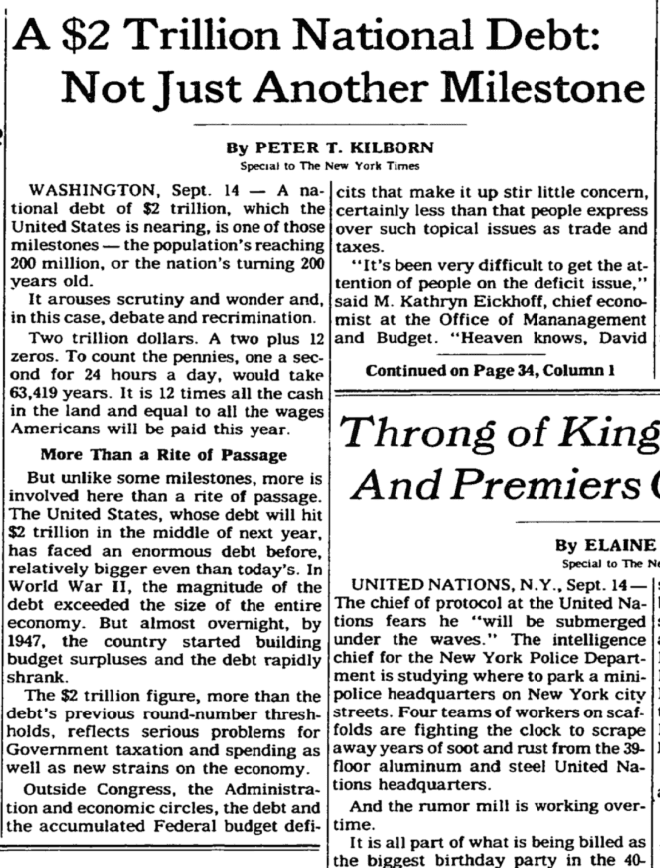Why No One Cares About National Debt Until It’s Too Late

In May 1984, 39 years ago almost to the day, Joe Biden gave a speech to the United States Senate about the country’s growing national debt. At that point, the debt was nearing $2 trillion, a measly amount compared to today’s national debt, which is approaching $32 trillion. Truly incredible, $2 trillion is quite literally a drop in the bucket compared to that. But it was still a lot, and Biden said it was a lot.
That day in May, Biden stood up from his Delaware Senator’s seat and proposed what now would be considered a radical solution: quit all government spending increases, yes, quit all of them. The official Senate notes from the day tell us what Biden said on the Senate floor: “If we fail to act decisively on deficits, if we allow the economy to come crashing down, this future agenda of the administration may well be only the beginning.”

“So to be clear, spending and the national debt is not a partisan issue. All parties share a bipartisan neglect for the national debt.”
Biden was right. It was, in fact, only the beginning. The moment was weirdly foreshadowing. Now, in the same month of May, 39 years later, with Joe Biden as President, huge spending plans pushed hardest by his own party bring politicians into a panic as they ponder whether to vote to raise the debt limit and borrow more.
Nowadays, Joe doesn’t push to stop spending. Times have changed, it seems. Higher education has become a human right. In some ways, times haven’t changed though. Biden’s 1984 plan was busted in the House of Representatives and never made it into action. Since the year 2000, the U.S. has never once decreased its national debt. Joe’s predecessors, Obama and Trump, were two of the biggest culprits who raised it. They both touted their spending on the campaign trail too. Obamacare was financed with debt. So too were Trump’s pandemic-era stimulus bailouts. Then came Biden. His bailouts were bigger than Trump’s.
So to be clear, spending and the national debt is not a partisan issue. Everyone shows bipartisan neglect for the national debt. And while Biden blamed “the administration,” perhaps to turn guilt into the leverage needed to pass his plan in the Senate by one solitary vote as he did, “the administration” is not really to blame. It’s people. People like free things, and they don’t like the prospect of getting fewer free things. And they elect politicians who know their reelection chances hinge on promising more free things. It’s a bad dynamic, but human nature demands it, and the system doesn’t prevent it. A 1985 edition of The New York Times, dug from the archives, phrases it beautifully: “Outside Congress, the Administration and economic circles, the debt and the accumulated Federal budget deficits that make it up stir little concern, certainly less than that people express over such topical issues as trade and taxes.” And thus the spending cycle continues. Pretty soon, and pretty soon means by 2050, as estimates put it, we’ll have to raise the debt limit to even afford to pay the yearly interest. That will definitely raise taxes.

While it’s pitiable that people in the U.S. are unable to uproot their fancy for free things, they are not alone. The mighty United Kingdom boasts a mighty £2 trillion debt, and that number is expected to rise exponentially in the coming years.
Economists have a saying that “There’s no such thing as a free lunch.” It’s not crazy expert speech. A person doesn’t have to be an economist to understand what it means, and a lot of problems would be solved if more people understood it. Basically, if we do or consume something now and don’t pay for it, somebody will have to pay for it later sometime. People then tend to assume the government can pay for everything they can’t afford by themselves. They say things like college and healthcare are human rights and should be free. Some folks even say housing is a human right. The government can pay for all of those things, right? No. They don’t realize that a government is just an extension of the people it represents. Governments get money by taxing people, and any money that a government borrows has to be repaid by its people through taxes. There’s no such thing as free anything.
If the U.S. defaults on its national debt, it means people can’t pay enough taxes or the government can’t borrow enough to cover the yearly interest on the debt. We’re close to that happening now, and it gets worse each time the government borrows more money. If it happened, it would set off a chain of really bad things. And yet people don’t care because they’re busy thinking about taxes. Life makes sense sometimes.